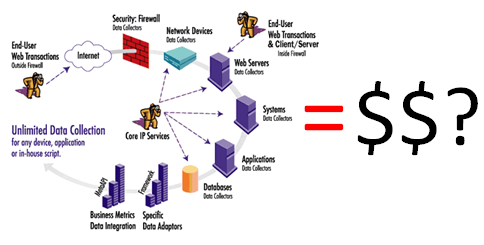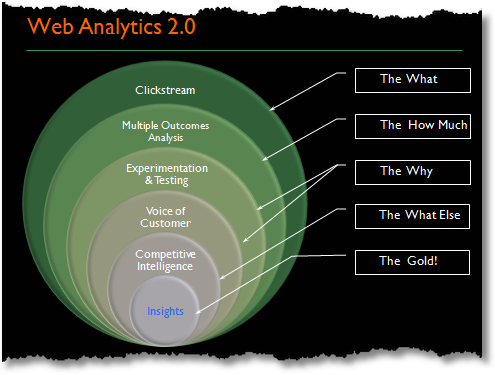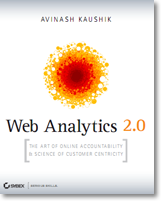 We, especially we the readers of this blog, often struggle with moving our organizations to be more data driven. The beautiful irony is that the bigger the organization the less likely it is to be data driven, inspite of large sums being spent on tools and applications.
We, especially we the readers of this blog, often struggle with moving our organizations to be more data driven. The beautiful irony is that the bigger the organization the less likely it is to be data driven, inspite of large sums being spent on tools and applications.
It is possible to create truly data driven organizations , but for my "Guru" talk at eMetrics summit in Washington DC tried to tackle a much more solvable problem: Creating a data driven boss (or the boss's boss or the boss's boss's boss's boss or….).
My hypothesis is that not only is this a solvable problem, but that it is also a way for you to be in an environment where you can be challenged while adding value to your big / small organization.
Before we dive in I must say that it is my assumption that you actually want to do this and that you have the passion to fight the good fight. Glory and higher salary will be the obvious end rewards, but by themselves they are not motivation enough.
You have to have the passion to want to roll the big boulder uphill, here are your weapons………
Six Steps to Creating A Data Driven Boss:
# 1: Get Over Yourself
The absolute critical first step. You were hired because you bring skills that are unique. It is quite likely that you are smarter than everyone else when it comes to data skills . Hence you want to do amazing and awesome things and create a multi-dimensional statistical regression formula with fifteen variables that could predict the temperature of your website every second.
But your boss stubbornly wants a report that shows referring url's and trends in visits.
You are disappointed at how little value you are adding. Stalemate. Unhappiness. Lack of data driving anything.
Get over yourself.
You have to figure out how to talk to your boss and his peers at their, possibly less data smart, level. Remember it takes time for any organization to evolve and I find that lots of Analysts and Marketers let their ego's get in the way. "I can't believe I have to do all this silly stuff rather than….. " You get the idea.
Of course you do. :)
Learn how to communicate with your boss, or his boss. Give them what they want so that they will get on the evolutionary cycle.
Here's another benefit, your boss is aware of a lot more context about what it going on in the organization and in terms of strategy and focus and goals and everything else. That information is critical to your success, it will make sure that you have all the context and intelligence you need to ensure you are solving the right web analytics mysteries .
Solve for evolution, if things are not as instantly smart as you want then don't be discouraged, leave your feelings aside and communicate (really) and understand your boss's perspective. Then figure out how you can solve for him and not you. For now.
This is harder to do than you can imagine. But give it a try.
# 2: Embrace Incompleteness
Many of us come to the world of Web Analysis with experiences in traditional analytics where things can be counted to the last drop. On top of that we are classically trained to not to take risk and to only make decisions based on data we can swear on to be "accurate".
The problem is that we live in the most perfect imperfect medium in the world: the Web.
For now it is impossible to collect data perfectly. It is ugly, it is dirty, it is incomplete and no matter how hard you try it is not going to get perfect.
Yet we can't resist.
We obsess about silly things like cookie deletion rates. We go down rat holes of chasing down the last 5% of the deltas.
Not only is that effort not worth it, it is futile. Simple reason: You can't ever know what the total number of Page Views were on your site, much less every thing else.
And that's ok.
Now here is the silver lining in this dark sky. We live in the most data rich environments were we can find a ton of actionable insights.
Think about it. Taking our ads in Fortune Magazine is a completely faith based initiative. Based on the number of subscribers the magazine has you assume there will be an outcome. Or maybe we do some primary market research.
You can do much better than that on the web.
You can see exactly how many people got the "magazine", you can see how many of them read each "story", you can see the ads they were "exposed to", you can….. and that's just the basics. You can see were each person came from, what drove them to have a interaction with you, what the outcome was, did it result in a positive brand impression and so on and so forth.
Yet we obsess about the last 2% perfection, and we waste the opportunity to use 80% great stuff we have.
So make sure you are on first party cookies, tag as many campaigns as you can in a clean way, collect data and make decisions. Resist the temptation to be perfect, it is the enemy of good enough.
Embrace incompleteness and it will set you free. Both you and your boss.
# 3: Give 10% Extra
Organizations run on reports and so does your boss. They ask questions and you give spreadsheets. Then they ask for more and you automate the production of spreadsheet.
The other day someone was recommending that the only tool you should use for web analytics is excel! Then they proceeded to share best practices on how to write complex macros and reference cells and reduce the pain of creating spreadsheets.
Here is the problem with that: You were initially providing data, and now you are providing data without even having to look at it!
How is anyone going to find actionable insights?
Your boss is fifteen steps removed from data, you are closest to it. Yet now you have become a reporting squirrel (I was going to say monkey but that sounds rude).
As the person closest to the data is it not your job to Look at it? Look and understand and make recommend?
Make a conscious choice what job you want to be in: Reporting Squirrel or Analysis Ninja ?
[Bosses: When you pay people / consultants to do "data work" also make this conscious choice – are you paying the consultant to be a RS or a AN? Don't hire a Squirrel expect them to do a Ninja's job.]
Next time Your boss asks for a report, give them 10% extra.
You do that by actually looking at the data. Stare at the table. Go visit the website, click around, experience it, then go back to the data, connect the dots that only you can because you are the smartest person in the room.
Now give your boss 10% extra: Your insights that your boss did not ask for.
Make a recommendation. Tell them what is working. Tell them what is broken. Tell them that xxx or yyy is a better metric to answer the question.
You create a data driven boss by giving them something they can drive from data. Not by giving them spreadsheets or reports or only what they want.
At the end of each week ask yourself, did you give your required 10%? 10% extra is all it takes.
Got Ninja?
# 4: Become A Marketer
I find that great Analysts are not simply "data people". They are "customer people".
Yes they have all the qualities that we have talked about before (critical thinkers , curious, common sense, etc). But a delightful quality I have found is that are Marketers.
The reason is that different parts of the organizations care about different things but Marketing cares about the business with a very unique perspective.
If you want to change your boss and your company then you'll have to become a Marketer, someone with an understanding marketing principles, someone who can be a customer advocate / champion, someone who can evangelize the purpose of data in creating customer centric decisions.
Sales cares for selling, IT cares about keeping servers and sites up, Engineering cares about building things that can hopefully be monetized, Marketing cares about customers and, most of the time, they care about a longer term success and not simply meeting this month's quota.
No matter what organization you are a part of, you have to become a Marketer. Think like a Marketer and execute with that mindset.
Your job is to "market" your data in unique and innovative ways that solve for the customer. Get an understanding of marketing.
Take a course in marketing at the local university, read up on it (I subscribe to Seth's RSS feed), partner with the Marketers in your company and absorb.
Your boss will love you. Your career will soar.
# 5: Business In The Service Of Data. Not.
Lots of companies are data rich and tools "richer". In fact in many of them extensive data efforts to mine the logs and extract and xml and data warehouse it and mix it and merge it and clean it and build for scale and BI it and……..
Nothing.
No insights come out.
In the obsession about capturing, processing, storing, moving, shaking, baking data the core reason for doing all that is forgotten.
When the question is asked, rarely : What has all this complexity delivered for the company? The answer usually is: We have lots of reports and know up to the moment exactly what is going on via our blackberrys.
Classic sign of a ecosystem were the business exists to produce data to employ people to do all of the above.
The business does not exist to produce data. Doh!
Data should exist to serve the needs to the business and provide insights that can be actioned. Get that mindset if you want to change your management's mindset about how decisions should be made.
Do an inventory, ask around, how many decisions have been made based on data that can be traced directly to have added value to the bottom line revenue numbers? [Bosses: Great filter to apply for Consultants you hire as well, ask them that last question.]
It is important, nay critical, to constantly check yourself and ask if the business is really serving the needs of data or vice a versa.
So what does this mean?
When you undertake data projects apply this advice: Do small, deliver in a month, measure if it had an impact on the bottomline (even if small). If yes continue to invest more. If not dump it, time to do something new.
Traditional IT projects tend to be long multi year undertakings that used to deliver in the traditional worlds. That does not work on the web.
On the web things happen too fast, they get complex too fast, and every data project you undertake starts to decay almost immediately. Embrace speed and flexibility and 80% good enough. Implement, measure value, if yes move forward, if not kill.
We don't kill enough, we plan too far, we "implement" for too long, we don't think smart and move fast . Change.
Data driven decisions are not made when you spend 95% of your time in "getting" data rather than analyzing what little (or a lot) you have. You want a data driven boss? Spend 80% of your time analyzing data and producing insights.
# 6: Adopt A New Mindset, Expand Horizons: Web Analytics 2.0.
-
One final bonus tip. Expand the data you use to make decisions, move away from clickstream clickstream clickstream all the time.
ClickStream data is good at the What. We have tortured it to find insights. We have done the best we can with just knowing the clicks. It has worked ok, but it has not done spectacularly. Hence we have tried to take it to the next level by adding a bunch more clicks together and making it more complex. That is not stuck at all.
The other problem with a clickstream only strategy is that your bosses don't get it. There is lots of confusion, still, about Visits and Visitors and Unique Visitors and Sessions and…. So when you and I add / divide / subtract / multiply our clicks and page views and present analysis it does not have quite the impact we want, because at some level our bosses still don't get it.
That's quite ok.
Web Analytics 2.0 is your friend.
There is one important reason for that: with Web Analytics 2.0 you are talking your boss's language, that of Customer Voices and Competitors and, get it (!), Money!
Most web analysts focus on analysis with Omniture and WebTrends and Visual Sciences and HBX and Google Analytics and Coremetrics etc.
If you are one of those consider expanding your skills and experience to understanding and executing Surveys and Remote Usability Testing and A/B – Multivariate and Testing and competitive intelligence and so on.
Doing that will mean that you can represent the customer voice back to your bosses with qualitative data. It will mean that you can fight the HiPPO driven opinions with data beyond clicks. It will mean that you can kindle a small fighting fire in your boss by showing how your competitors are doing.
You boss might not care about clicks, but you bet your bottom she/he cares about customers and competitors.
As you create your own execution strategies do a Web Analytics 2.0 checklist. How many cylinders (above) are you firing on?
Can you believe that I did the above presentation in 12 minutes with eight slides? :) [If you were there share your feedback! Looooong twelve mins?]
Creating a data driven boss is not difficult. All it takes is some or most of the above six things. I wish you all the very best, may your days be brighter and your bosses more data driven!
Ok now it's your turn.
Please share your perspectives, critique, additions, subtractions, bouquets and brickbats via comments. Thank you.
[Like this post? For more posts like this please click here, if it might be of interest please check out my book: Web Analytics: An Hour A Day.]








 Via
Via 














As usual, Avinash…spot on! And, as is generally the case with your posts, these guidelines can be applied well beyond the realm of web analytics.
I read a real (and valid) balancing act between part of #1 and part of #5. On the one hand, there is credibility/trust-building: "start them on the evolutionary path by giving them what they ask for" (in a timely, clean, well-presented manner (#1). On the other hand, there is a "do an inventory of reports" to identify the ones that aren't driving insights and action (#5). To be clear, these are NOT directly in conflict, but they do put pressure in two different directions. And, if, in the service of #1, you *do* automate a lot of reports, then it can be more work to *stop* reporting (by asking the questions as to their usefulness) than it is to continue to produce them.
I'd love to see your thoughts in a future post (or maybe I've just missed one where you've already covered it) about how to go about auditing existing reports and EOLing ones that are not adding true business value. It's not as easy as asking the recipients, "Does this report drive action?" because there's a human psychology element. Even if the report is not driving action, chances are the person you're asking has been inundated with articles about how he/she needs to be "data-driven," so, regardless of the truth, his/her answer will be: "Um. Of course!" (and then makes a mental note to start looking at the report again). The solution is to ask, "Help me understand *how* you are using the data," and to tease out the user's true needs/questions. Even if the report doesn't get killed, it almost certainly will get an overhaul. More work for you…but more value to the company.
Avinash — can you whip out a 6- or 7-point list on this topic for us? ;-)
I attended all three of your sessions at eMetrics and they were all fantastic, for me they were the highlight of the summit.
The guru talk was great. In this post I think you added a lot more nuance and some new thoughts that make it this post valuable. But I would trade it to see your passion and personality in a live presentation because I really felt energized.
Thanks for taking the time to convert the guru talk into this post.
Luke.
Nice post. I agree with Luke, this is a great summation of your guru presentation. I especially like the "circles" slide you added and believe that one needs a little more game play.
I've also been noticing an underlying theme in your talks this last week about testing and retesting ideas:
I'm a huge fan of MVTs and AB Testing and would love to a follow up post on "Creating a MVT or AB Testing Boss". Are you taking requests?
Good advice as always Avinash. To me the whole Web Analytics 2.0 is about actionable data. Data that you can create revenue increasing plans from. And increases to the bottom line are sure going to please the boss. Clickstream data is not directly actionable. By taking a more rounded, 2.0 approach and having directly actionable data you'll be a favorite with the boss, roll on bonus time!
Avinash –
(FYI)
I am torn whether or not to comment as I am trying to get over myself and embrace incompleteness but I must give the extra 10% and point out the typo (I believe) in the third sentence under #3.
Great post / blog / book.
Short-time reader, first-time commenter.
Phil
Great presentation/post. I appreciate the recap, because I don't think I could have written that down in 12 minutes even if I had seen it. :)
As a marketer that relies on a analytics team, I very much appreciate the rules given. Tim's point is very valid too, that it can apply to other fields besides analytics.
The best internet marketers aren't strangers to analytics, and these guidelines are great for them as well (especially #4, sadly) in their responsibilities.
Great recap of some of the biggest ways to improve for any online analyst/marketer.
Interesting stuff! It can be incredibly frustrating when you are tasked with collecting data and making recommendations, only to be second-guessed and overrun when the "boss" makes a decision on a course of action that flies in the face of evidence you present that favor a totally different alternative.
I have found that this happens most often when data collection and analysis is placed ahead of "what criteria will we use, and which will be most important?" in the decision making process.
For those that like to let the data speak for itself, it can be helpful to involve the boss in the criteria creation and prioritization process, before the data is even collected.
For example, if we are buying a car, I want to involve the "boss" at the outset, by simply asking, "What will be our criteria, and what will be their relative level of importance?" before we even see or test drive a single car." He may come back and say, "Cost is most important, followed by fuel efficiency, and then reliability." Now, if we get consensus on this priority, when we collect our data as to the relative cost, fuel efficiency, and reliability of the vehicles, the decision should be an easy one! Unfortunately, what often happens, is the "boss" examines every vehicle, finds that he really likes how he looks in the red sports car, and then skews the decision making criteria and importance to favor the red sports car in any way possible.
IMHO, Involving the key decision maker in this strategic step before data collection and analysis is key.
I believe the following has been said a thousand times, but the best time was when it was uttered by someone's young son: "Don't give them what they want, give them what they need."
If a boss is used to receiving reports he/she sometimes doesn't even consider the possibility that there could be something better. Therefore you need to understand what they need, and not only what they're asking for.
Your boss may be asking for a cake, and it may be quite stale. You can give him the cake he wants — but you can also give him a really tasty icing on it. After a while he might go straight for the icing!
PS. What would a Teenage Mutant Ninja Squirrel be?
PS2. The National Association of Squirrels are filing a complaint against stereotyping of squirrels.
:)
Love the "Analysis Ninja". Maybe that will be my Halloween costume this year :)
Great post once again.
Tim : I love your stress on driving action and on the audit. I will do my best to whip up a post based on your suggestion as soon as I can. (Ditto for your Jeremy!)
Phil : You win the "comment of the day" prize! And thank you so much for the help. Sentence fixed now.
Kristen : Pictures please!! :)
Thanks everyone for the comments and wonderful perspectives.
-Avinash.
Great post Avinash — though I would have prefered the term an 'Analytic' driven boss over 'Data' driven :-) as sometimes folks are too much into data and reports (like you mention) without placing enough emphasis on analysis and getting insights.
On the points, you have made some excellent remarks. Especially on #1, one thing folks sometimes don't realize is that the boss has a bigger view of the 'world' (or more context as you put it) and a lot of times it pays to listen to your boss instead of dismissing him/her as an imbecile just because they cannon get your 'analytical' viewpoint. The key would be to take those contexts and work them in your work/analysis so that your boss is more receptive to the ideas.
I also agree with your remarks on automated reports. Sometimes an automated or scheduled report is fine (maybe a high-level KPI dashboard), but more often than not I have found that by making a "report" automated you have put it on a path to oblivion or decay (My thinking is that the longer a report has been automated, the more useless it is (by not keeping up with changing assumptions, changing market place, and changing benchmarks) and fewer folks are using it or even reading it).
And as you refer to, many a times it is not that the boss does not accept the fact about the data being there — more than likely they are not able to connect the dots and visualize the ROI/value add from it. From this respect, you have put yourself through a POC with your boss by first showing a sample of what you can deliver and how it can be a value-add in making the right decision. If you are convincing enough, your boss will 'pass' the POC and ask you to go into 'production' :-).
And lastly, I do like your Reporting Squirrel and Analysis Ninja analogies :-)), I might just borrow those . …till now I have been using 'Data monkey' in my work to denote folks who just pull data without doing any analysis or adding insights.
-Ned
Great post, as always.
On the report auditing discussion–
I'm a big believer in the "stop sending it and see if someone screams" school of thought. If you are sending an automated report that hasn't received questions or comments in a while, chances are, no one is looking at it.
Extraneous reporting (RS stuff) dilutes the impact of the thoughtful analyses (AN stuff) you do.
-Jared
Great post, Avinash. This is definitely the right way to think in all areas of business. It is very easy to get focused on the data that relates to a specific job or competency and forget about how it connects to the company's profitability.
What I find most interesting about the web is that it is one of the few areas where an employee has enough information to directly impact the bottom line and measure it in a non-open-book company. This is a powerful tool! Just as any client will start shelling out bucks if they can clearly see that you are making them money, you will quickly become your boss's favorite employee if you can clearly show him/her that you are making the company/division more money.
Since I'm pontificating about things that are only loosely related to analytics: to me this is the difference between physicists and engineers. Physics is the art of knowing what is not important so that you can reach a conclusion, whereas engineers often struggle with all of the things that they don't know, even if they are not important. The mentality of focusing on what you need to know to move forward (actionable insights) is the key to getting something useful out of web analytics.
Last thought: the extra 10% is essential. A lot of people seem to think that their boss wants to see the data and do the analysis themselves. In my opinion, most bosses are too busy, and really they want to see a report that uses good data and already has the analysis built in. That way their backsides are covered and they can quickly choose to move forward with the best option that helps the company without a lot of work.
Great post.
I seriously love this post and translated it into a drug design setting.
A very inspirational post for a newbie like me. =)
Great post, Avinash. I'll put my warning out that accomplishing 1-5 steps may takes years, so learn to persevere.
Here's another topic for you – How do bosses force "insights generation" rather than "data trends" or "analysis results"? Instilling this practice in an organization is lot tougher than it may seem – tips will help.
What you say about search engine optimization gaps made me extremely curious, Avinash. Especially because I must admit I have no idea what it means :-).
Ok I'll stop kidding, by search engine optimization gaps do you mean things such as being overly optimized for a few keywords/getting most of your traffic to less than a handful of pages on your website?
I assume that guess is wrong, because Google Analytics (and any other click stream data tool) should be able to give you this type of data?
So what is it?:-)
Patrick, I am not sure if Avinash would agree completely, but recently I heard him speak about this topic in relation to adwords, and my take on it as it relates to blog was tailoring your articles after initial posting to take advantage of the way you are appearing in Organic Search results.
Read the article about Building Traffic by adding quality to existing content.
Patrick : I meant SEO gaps in the purest sense of the word. Missing meta tags, duplicative content, old content, broken links, links to "undesirable" sites, and more such stuff. To play the SEO "game" :) these are all the price of entry, and a bit more. It is important to ensure that you are covered when it comes to all of these things.
Once you have the data then you can overlay your own vision of how you want to be optimized, and sprinkle the necessary snake oil to ensure your business is getting what it wants.
-Avinash.
Great post. I love the bit about the extra 10%, and getting over myself. In my experience I have found that I know all that is possible, but I forget that my boss is my customer. Sometimes I let my imagination run wild and forget what the boss requires and delve into the 'nice to have' realm before I tackle 'need to have' items.
That being said, there is a large contrast between giving the report he/she asked for and giving them the insights he/she wants.
Excellent list. But there is a big hurdle to take first. When realizing information solutions in general there is not such thing as "the business"! Please read the following article describing this phenomenon:
link: via-nova-architectura.org/files/magazine/Baarda3.pdf